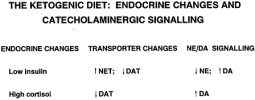Cortisol is required for converting T4 to T3 so if it's not available because your adrenal glands have become too depleted to produce it, your thyroid function also suffers.
If you need energy in the morning, 1 or 2 DLPA capsules first thing in the morning and in the mid-morning. If you need an endorphin boost in the afternoon, for example if you are a 3pm chocolate nibbler, then DPA at that time.
[...]
Testing cortisol
Most people have been exhausted by too much stress.
Their cortisol levels in the morning, at noon, and in the late afternoon are on the low side.
But their bedtime levels may still be surprisingly high. Even if they're in the normal range bedtime, if these levels seem to be higher than the levels earlier in the day, they may keep rising in the night and wake them up at some point. Then “phosphorylated serine” (Seriphos, not the same as phosphatidyl serine), taken before dinner (6 hours before bedtime) should get you to sleep. Take it again 6h before you would typically wake up in the night or early morning. Seriphos encourages your pituitary gland to stop sending the order for more cortisol. After a month you shouldn't need more. Do not take Seriphos for more than three months total. Take a break for at least a week after each month's use.
If your early morning cortisol levels are high, they can wake you up too early, but don't use seriphos until you find out why. Usually it is a chronic yeast or parasite infection, or bacterial. Sometimes though, you need a bedtime snack to keep your blood sugar from dropping in the night, triggering an inopportune cortisol release.
Adrenal exhausted by stress coping often make insufficient sex hormones, which can lead to sleep disturbance. This is typically a factor for women with menopausal and premenopausal sleep problems.
[...]
You may need a bedtime snack if your blood sugar is dropping at night and triggering a bedtime cortisol surge that keeps you awake. Or you may need to use phosphorylated serine (seriphos) which is a combination of phosphorous and calcium with the amino acid serine. It reduces ACTH (pituitary) messages that order your adrenals to release emergency amounts of cortisol. Pregnant and lactating women can't use it.
If cortisol is high in the morning, test for parasites, which tend to become more active at night, stimulating the adrenals to kick up your cortisol levels just when the should be dropping at the end of the day. Don't use seriphos, you'll need cortisol to get rid of parasites.
[...]
Prescription cortisol: to keep cortisol output at 23 to 40mg per ml. If someone tested 8, he is given 20mg, if high demands like in flu, then 40mg.of Cortef (hydrocortisone). Dr. Jeffries suggests microdoses of 2.5 to 5mg of cortef, two to four times per day. [
I synthesized Dr. Jeffries protocol in the Adrenal Fatigue thread here]


